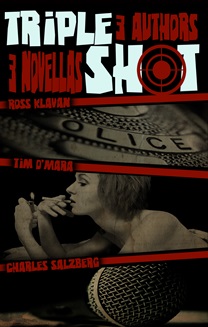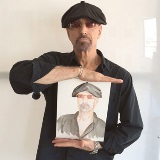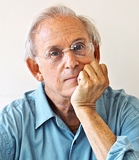
Ross Klavan “Thump Gun Hitched” – I’ve got two main characters. . .Ty Haran and Bobby Dane. Both start off as cops in LA and both end up without badges and in real trouble. Haran is older, an experienced special officer and a decorated veteran who fought in the Middle East and has no illusions about heroism. He’s also trying not to let Bobby Dane drive him back to drinking (and failing at that). As for Bobby Dane, he’s been like a son to Haran, looks up to him but never really caught on to what Haran’s been trying to tell him—“Try not to get yourself killed.” These two guys have had one another’s backs for years…and ultimately, that’s what gets them into hard times.
For questions. . .
–If I had to ask each of them personally, the question would be. . .”What the hell were you thinking?” I guess Haran would say that watching out for one another became a habit and eventually they ran up a bill between them, a debt, that nobody could pay. So when Bobby Dane needed help, Haran listened, even though he wanted to wash his hands of the guy. And I think Bobby Dane would say that he wanted to be like Haran, or at least his fantasy of what kind of guy Haran was, and that kind of thinking can lead you to trouble, the kind that you can’t turn back from.
–I’d ask myself. . .are these guys based on anyone real? Good question. They’re a combination of certain guys I knew in the Army and when I was reporting the news, mixed in with fictional characters so that the reader gets an interesting take on this kind of story. And, I used to know a guy who taught hand-to-hand combat and was mostly hired by the police and military. He said he was once a cop. . .until he spent a year in prison after doing something really stupid with a handgun while drunk at a cop party. That’s what gave me the germ idea for the story.
–I’d also ask about the tone of the story—it’s really sort of a Western with automatic weapons. As a city boy, I like the desert. . .I like the way it looks and the feel of just that much lurking danger. I have a lot of respect for the desert and the Sun and what’s out there and have had enough experience not to go too far out. But I enjoyed writing about two guys who were friends who wind up in real danger in a place that’s dangerous just because it is.
The lead character in Smoked, you can call him Aggie, is a low-level marijuana and crystal meth dealer doing business in an unnamed Midwestern state. He’s the kind of guy who—when not selling illegal substances—is either lying or rationalizing. (You can tell because his lips are moving.) After getting in way over his head, and putting the few loved ones he has in jeopardy, he finds an inner strength he never knew he had in order to make things right. Back east in New York City, we refer to this realization as “Growing a pair.”
Question: Is Aggie based on someone in your life?
Answer: Yes. And to answer your next question, I’m pretty confident I’m safe from any liability as this person doesn’t read all that much and would have to admit to some pretty shady—read illegal—activities if he (or she) ever decided to prove Aggie was based on him (or her.)
Question: Why base the story in the Midwest? Aren’t your Raymond Donne novels all set in the New York City (mostly Brooklyn) area?
Answer: I spend a lot of time in the Midwest as that’s where my wife grew up and my in-laws still live. I visit with my wife and daughter twice a year—summer and Christmas—and have developed quite a fondness for the location and the people. As much as I love NYC, I need to get out every once in a while, either physically or through my fiction. Writing about a location I don’t actually live in was quite a challenge and I learned a lot from taking it on.
Question: Will we see “Aggie” in a future novella?
Answer: Read Smoked—and the other two novellas in Triple Shot—and then you tell me. Since he is a first-person narrator with a penchant for manipulating the truth, it could go either way.
Trish Sullivan, approaching forty, is an on-air TV investigative reporter, working for a Syracuse, New York daily newscast. She’s smart, talented, and most of all ambitious. She realizes that if she’s going to move up on the food chain, which means getting signed by a network like NBC, ABC, and CBS, or a cable news network like CNN, MSNBC or Fox, she’s going to have to do it soon. And the only thing that’s going to get national attention is a big story. And so, when Trish is contacted by Meg Montgomery, who’s serving a life sentence for murdering her husband and two young children insisting she’s innocent, Trish thinks this might be the breakout story that gets her where she wants to go.
Meg Montgomery is in her early thirties, blonde, very pretty—thing a young Meg Ryan. She’s married and has two children, both under the age of 10. Or rather she was married with children. Now she’s in prison, convicted of killing all of them. She claims innocence and, with no other avenue open to her to prove that, she writes a letter to a local TV news reporter, Trish Sullivan, in hopes that Trish will investigate her case and perhaps uncover the real killer.
In effect, Meg and Trish are not so different—opposite sides of the coin—and this is perhaps what attracts them to each other.
Questions for Trish Sullivan
1. What made you go into the news business?
I’ve always been a news junkie. When I was a kid every night I looked forward to the news. I imagined myself up there, telling a story, breaking news to the public. My idol was Barbara Walters. She was tough, honest, and not afraid to ask the right questions. That’s who I wanted to be when I grew up. I wanted to interview important people. I wanted to travel around the world. I wanted to watch news being made and I wanted a hand in making the news.
2. What made you decide to investigate Meg Montgomery’s conviction?
Frankly, I saw a bit of myself in Meg. She looked fragile and yet she was obviously tough. She had to be to go through what she did. I was predisposed to believing she was innocent, but I wanted to make sure, which is why I offered her the choice. I wouldn’t investigate her case unless she took a polygraph test and passed. When she did, I was thrilled. This might be the story I was looking for, the story that would get the attention of the national news organizations. And if I could find enough evidence to get her a new trial, I was sure it would get me out of Syracuse and onto the career path I always wanted.
3. How did you feel when you realized you were being manipulated?
Betrayed. Embarrassed. Ashamed. I’d put my faith in Meg and she’d used me. My credibility was damaged, perhaps beyond repair. I knew I had to do something, otherwise my career would be over.
Questions for Meg Montgomery
1. Why did you marry your husband?
I was the girl from the wrong side of the tracks. The cute girl who was always popular in school, but still looked down on simply because I didn’t come from a family with money or prestige. Marrying my husband was a step to change all that.
2. What was your marriage like?
It was more like a business partnership more than a marriage. My husband gave me something: legitimacy and instant prestige. He got a very pretty woman to be by his side, which raised his stock as much as he raised mine. That’s why I say it was a business deal more than a love match. But love fades anyway, so I didn’t think I was doing anything particularly wrong. He gained something and so did I, but in the end I gave more than I got, because he was not the man I hoped him to be.
3. Did you feel remorse or guilt for what happened?
I’m not the kind of person who looks back. I do what I do, what I have to do to survive, and I try not to judge myself. I know other people judge me all the time, so why would I have to judge myself?
Shadow towns, smugglers and secret notes—this trio of New York authors are a Triple Shot of twists and turns in three novellas published by Down & Out Books, August 2016
Payback leads to an unmarked grave in Ross Klavan’s Thump Gun Hitched. A freak accident forces two L.A. cops to play out a deadly obsession that takes them from back alley payoffs to hard time in prison, then deep into the tunnel networks south of the border to a murderous town that’s only rumored to exist. Before the last shot is fired, everything they thought was certain proves to be a shadow and everything they trusted opens into a trap.
Life was so much simpler for Tim O’Mara’s marijuana-selling narrator in Smoked when all he had to worry about was keeping his customers, now ex-wife, and daughter satisfied. When he forges a reluctant alliance with his ex-wife’s new lover, he realizes there’s lots of money to be made from the world’s number one smuggled legal product—cigarettes. Unfortunately, his latest shipment contained some illegal automatic weapons. Now he’s playing with the big boys and finds the price of the game way over his head. Murder was never part of his business model.
And finally in Twist of Fate, Charles Salzberg follows Trish Sullivan, an ambitious TV reporter working in a small, upstate New York market. She receives a note from Meg Montgomery, a beautiful young woman convicted of murdering her husband and two children. Montgomery claims she’s innocent and Sullivan, smelling a big story that may garner some national attention, investigates and turns up evidence that the woman has, indeed, been framed. What happens next changes the life of both women in unexpected ways.
# # # # # # # # # # #
Meet the authors
 ROSS KLAVAN’s novel, Schmuck, was published by Greenpoint Press in 2014. He recently finished the screenplay for The Colony based on the book by John Bowers. Nominated for an Independent Spirit Award, his original screenplay, Tigerland, was directed by Joel Schumacher and starred Colin Farrell. He has written screenplays for InterMedia, Walden Media, Miramax, Paramount, A&E and TNT. As a performer, Klavan’s voice has been heard in dozens of feature films including Revolutionary Road, Sometimes in April, Casino, In and Out, and You Can Count On Me as well as in numerous TV and radio commercials. In other lives, he was a member of the NYC alternative art group Four Walls and was a reporter covering New York City and London, England.
ROSS KLAVAN’s novel, Schmuck, was published by Greenpoint Press in 2014. He recently finished the screenplay for The Colony based on the book by John Bowers. Nominated for an Independent Spirit Award, his original screenplay, Tigerland, was directed by Joel Schumacher and starred Colin Farrell. He has written screenplays for InterMedia, Walden Media, Miramax, Paramount, A&E and TNT. As a performer, Klavan’s voice has been heard in dozens of feature films including Revolutionary Road, Sometimes in April, Casino, In and Out, and You Can Count On Me as well as in numerous TV and radio commercials. In other lives, he was a member of the NYC alternative art group Four Walls and was a reporter covering New York City and London, England.
*****
 TIM O’MARA has been teaching math and special education in New York City public schools since 1987, yet he is best known for his Raymond Donne mysteries about an ex-cop who now teaches in the same Williamsburg, Brooklyn, neighborhood he once policed: Sacrifice Fly (2012), Crooked Numbers (2013), Dead Red (2015), Nasty Cutter (January 2017). His short story, The Tip, is featured in the 2016 anthology Unloaded. The anthology’s proceeds benefit the nonprofit States United To Prevent Gun Violence.
TIM O’MARA has been teaching math and special education in New York City public schools since 1987, yet he is best known for his Raymond Donne mysteries about an ex-cop who now teaches in the same Williamsburg, Brooklyn, neighborhood he once policed: Sacrifice Fly (2012), Crooked Numbers (2013), Dead Red (2015), Nasty Cutter (January 2017). His short story, The Tip, is featured in the 2016 anthology Unloaded. The anthology’s proceeds benefit the nonprofit States United To Prevent Gun Violence.
*****
 CHARLES SALZBERG is the author of the Shamus Award-nominated Swann’s Last Song, Swann Dives In, Swann’s Lake of Despair (re-release Nov. 2016), Devil in the Hole (re-release Nov. 2016), Triple Shot (Aug. 2016), and Swann’s Way Out (Feb. 2017). His novels have been recognized by Suspense Magazine, the Silver Falchion Awards, the Beverly Hills Book Award and the Indie Excellence Award. He has written over 25 nonfiction books, including From Set Shot to Slam Dunk, an oral history of the NBA, and Soupy Sez: My Life and Zany Times, with Soupy Sales. He has been a visiting professor of magazine at the S.I. Newhouse School of Communications at Syracuse University, and he teaches writing at the Writer’s Voice and the New York Writers Workshop where he is a founding member.
CHARLES SALZBERG is the author of the Shamus Award-nominated Swann’s Last Song, Swann Dives In, Swann’s Lake of Despair (re-release Nov. 2016), Devil in the Hole (re-release Nov. 2016), Triple Shot (Aug. 2016), and Swann’s Way Out (Feb. 2017). His novels have been recognized by Suspense Magazine, the Silver Falchion Awards, the Beverly Hills Book Award and the Indie Excellence Award. He has written over 25 nonfiction books, including From Set Shot to Slam Dunk, an oral history of the NBA, and Soupy Sez: My Life and Zany Times, with Soupy Sales. He has been a visiting professor of magazine at the S.I. Newhouse School of Communications at Syracuse University, and he teaches writing at the Writer’s Voice and the New York Writers Workshop where he is a founding member.
All comments are welcomed.
Giveaway: Leave a comment below for your chance to win a print copy of Triple Shot. US entries only, please. The giveaway will end September 19, 2016 at 12 AM (midnight) EST. Good luck everyone!

Three very powerful stories. Most intriguing in the each of the three seem to have roots in real life. I say “seem” because Charles, you didn’t say if either Trish or Meg are based on real people, but I can think of several people who would fit the profile for each of them.
I’d love to read these stories! Thanks!
Sounds great. I’d love to win a copy!
Oh, Wow. what a great set of stories.
I’m very interested in winning this one. Please!
Thanks for the chance!
Impressive and wonderful feature and giveaway. Thanks.
These stories appeal to me very much. From the review, the content and setting are calling my name. Thank you for the chance to win!!
Very compelling stories. Would enjoy reading.
Would like to give this book a try…..
Thank you for the giveaway…..
This book has a great plot.
Thank you for the chance to win this book! It sounds like one I could really get into!
Thanks for the giveaway!
Definitely grabbed my attention. Must read more to decide which story is more compelling.
Interesting.
This sounds like a wonderful collection of stories. I’d love to win a copy, thanks for the chance.